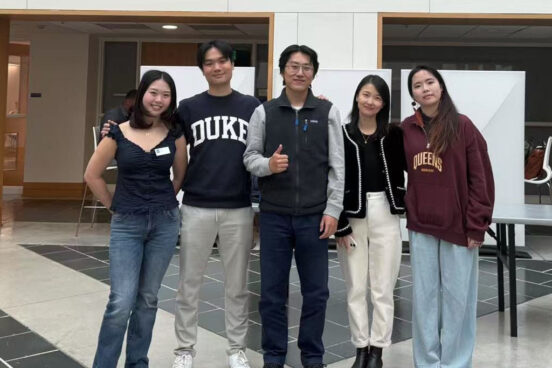Duke MMS Student Blog

What I Learned During the Accenture Case Challenge
Just a disclaimer: I didn’t win Accenture’s case competition. I lost. I learned. I lived to consult another day. Here’s what I took away from that lightning hour of casing and our ten-minute presentation

Just a disclaimer: I didn’t win Accenture’s case challenge. I lost. I learned. I lived to consult another day.
The Challenge
Accenture is one of the worlds’ leading consulting firms and has been coming to Fuqua for a number of years to host this competition for MMS students. During the event, we worked in teams of five or six to develop an innovative solution for a real-world business challenge that Accenture gave us and presented our idea to a panel of judges.
Throw in a networking session with Accenture recruiters and employees (including MMS alumni) and the fact the winning team receives an invitation to dinner with an Accenture executive and the potential for special consideration during recruitment interviews—let’s just say the pressure to perform was high.
Here’s what I took away from that lightning hour of casing and our ten-minute presentation.
Research the Company
I know this is a must before interviews. But before a case competition? Who would have guessed! I didn’t guess. I was told. Before the competition, I contacted two MMS alumni at Accenture for advice, and both told me to read the company’s website to familiarize myself with the type of projects the firm does. My bedtime reading of Accenture’s “Insights” articles minimized the surprises waiting for me on game day. I knew the words Accenture likes to use (disruption, blockchain, cloud computing, all that technomancy).
It turned out the case prompt fit my expectations. I had questions for the networking session that the Accenturians hadn’t heard five times in as many minutes. The reading paid off.
I slipped up though. I didn’t take it to the next step and incorporate all this research into my team’s solution. Why not? That leads to my second big takeaway.
Reread the Question and Refine Your Framework
“Give me six hours to chop down a tree and I will spend the first four sharpening the axe.”
Abraham Lincoln
“Give me one hour to crack a case and I’ll spend at least ten minutes analyzing the question and crafting a framework.”
Me, from now on
I noticed a theme in the judges’ questions after each team’s presentation. They usually asked some version of “How does this relate to X part of the original question?”
My theory is that a lot of teams strayed away from the core of the question because of their frantic pace. You see, when you have an hour to prepare a ten-minute presentation on the Friday before finals, the air can get a bit tense. Heartbeats drum faster. Sweat rolls down foreheads. Instincts take over. And your instinct will probably tell you to go fast.
“Floor it,” your amygdala will scream. “You only have one hour!”
Then your team will feed off each other’s nervous energy like a potluck party. That’s what I did at least. Try not to do that.
Instead, recollect your cool and establish a framework that your ideas can hang on. This helps you develop structured, coherent thoughts. Be calm enough to pause and make sure every point your team comes up with remains tethered to the original question. Be the one who takes the breath, then answers the question head-on. Maybe read Aesop’s fable about the tortoise and the hare before the case.
Remember Your Coursework
In that high-pressure environment it’s easy to forget that we spent six weeks studying business communication, data analysis, and all the skills we needed to crack this case. I spoke to one of the winners right before he found out he won. His team’s presentation had so much grace with the introduction, outline, and the smooth transitions between points. I asked him how he did it.
“We just treated it like a business communication class project,” he said.
Genius. Trust in your training. Bring the case into the realm of the familiar to calm the nerves and give your brain a head-start.
Accenture’s case competition gave me a lot, even if a trophy wasn’t included. I plan to build on this experience to dazzle my interviewers in the near future. Just you wait and see. In the meantime, I hope you can learn something from my experience too.



